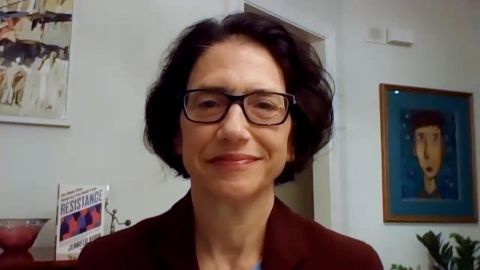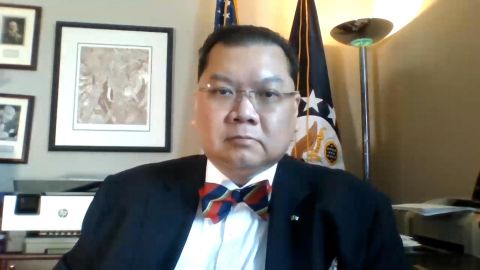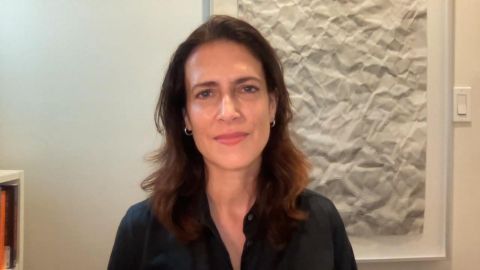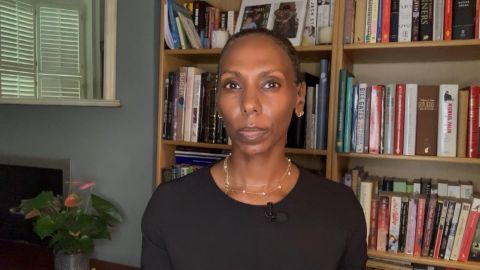Read Transcript EXPAND
BIANNA GOLODRYGA: Well, we turn now to a look at how women have turned the tide in U.S. politics. At least that’s what our next guest, “Washington Post” columnist, Jennifer Rubin says. Her new book, “Resistance,” explains how female voters, activists and politicians fought for democracy. Here she is speaking to our Michel Martin about her own political reckoning.
(BEGIN VIDEO CLIP)
MICHEL MARTIN, CONTRIBUTOR: Thanks, Bianna. Jennifer Rubin, thank you so much for joining us.
JENNIFER RUBIN, AUTHOR, “RESISTANCE”: My pleasure.
MARTIN: Before we get into how women saved democracy from Donald Trump, your words, it’s the title of your book, I want to talk about one woman, you. I’d like to talk about your own evolution from where you started out politically to where you are now. You’ve said several times, in fact, originally, your column was called, you know, “The Right Turn.” You identified yourself as a conservative, a moderate conservative. Just tell me why. What are some of the origins of your kind of political philosophy?
RUBIN: Well, not to date myself, but I guess I came to a political maturity when the Cold War was still going on and Republicans had a view of international leadership on — in the battle against communism that I identified with. I generally favored free markets. I favored free trade. Robust legal immigration. The rule of law. And more importantly, a professed concern, at least at that time, that government should work with humility, incrementally, respecting the institutions of civil society. And those were principles that I believed and, at least at that time, the Republican Party is found.
MARTIN: And so, when did that change for you? Was it all because of Donald Trump?
RUBIN: Well, certainly, there were signs within the Republican Party that were deeply disturbing. But it was not until Donald Trump that those forces really rose up and constituted the majority view and now, the exclusive view of the Republican Party. And, you know, I had always fought back against elements that were seemed to be intolerant. I, as I said, identified with the Ronald Reagan wing of the party that was pro- immigration but certainly there were immigration restrictionists. But when Trump came along and the party fell for him, hook, line and sinker and people who I had previously respected decided to turn on a dime and throw out past convictions, that was just too much for me. And I must say, I went through a period of time, I refer to this in the book, I felt like I was sort of in the land of the body snatchers, that people who had previously been advocating rule of law, democracy, all of these wonderful things now were cheering for Donald Trump. And when it became obvious the party would not reject him in the spring of 2016, I wrote a letter, an open letter, breaking up with the Republican Party, and saying I can’t be part of this. Just as I suspected, things really went downhill from there. And it turned out to be relatively few in public life, although we’ve tried to make a fair amount of noise, who left the party or who spoke up. And the vast majority of Republicans simply went along. And that really was an eye opener on a personal level as well as a professional political level.
MARTIN: So, tell me about the book. What was your goal with the book?
RUBIN: I felt as I was watching this that there was a great untold story that although people spoke about the resistance generically, the popular media was not really appreciating the tremendous role that women per se were filling and particularly, their self-organization. The way they mobilize. They way that they knit together new networks. The way ordinary Americans who had never run for office en masse decided to, many of them women. And really, I thought that this array of women was quite remarkable and quite inspirational in a sense, that these were people who decided that democracy was not a spectator sport. This was participatory. They had to up the game and they had to get into the arena. And they did. Many of the women who ran for office and won, in many cases, were women with a national security background, with the CIA or with the military. And these women had an ethic of public service that went back decades. And when Donald Trump came along, they saw that once again, their country was threatened. Not by an outside enemy but by an internal threat to our democratic values and norms. And so, they stepped up. I tell the story of Abigail Spanberger who is now a sophomore congresswoman from Virginia.
MARTIN: A former CIA operative, one of the people with a national security background. Just as you just mentioned.
RUBIN: Exactly. She went to a town hall run by her then congressman, Congressman Brat, who you recall was a very unconservative tea partier who had displaced Eric Cantor at the time, he had been the majority leader. So, he was really kind of hot stopping the Republican Party. And then, she sat there listening to him as he tried to defend the Muslim ban and went on and on about a whole variety of issues. She thought to herself, this guy does not know what he’s talking about. I could do this. And that experience was repeated over and over again. When women got an up- close look at their political representatives, they were not very impressed. They were arrogant in many instances, ignorant in many instances and they really discovered, you know, I’m an educated person. Whether they had a national security background or not, I have figured out how to organize in business, in my private life, in my professional life, as a mother going up in PTA meetings or organizing community events, I can do this too. And it was such a reaffirmation of, I think, what the founders had in mind, when they wanted citizens to participate in politics and not have a political class that was remote and unaccountable to the people.
MARTIN: You profile a number of people who I think may be well-known in a Washington, D.C. context or sort of, you know, political circles, like Abigail Spanberger, as you said, she’s a member of Congress, but are not necessarily national figures. Well, where were some of the other people whose stories, you know, impressed you?
RUBIN: Well, there was one woman who was actually a constituent of Spanberger who is Carol Patran (ph). And she decided after watching the election with great depression and great angst, that she would get kind of her neighbors together and see if maybe they could do something. And there was another group in Chesterfield County, which is kind of Central Virginia right around Richmond, who was also organizing. And they put together really, without thinking through all of the consequences, a group called the Liberal Women of Chesterfield County. They became about 2,000 or 3,000 people strong. And they became a force to be reckoned with. They were able to recruit talents for the first time on the Democratic side to run for office in what was a relatively conservative district. So, that up and down the ballot on state, local and federal races, there was at least somebody running on both sides and they became sort of a political force where candidates felt compelled to come by, to get to their nomination, to be vetted by these women. Many of them volunteered on presidential campaigns of — not all on the same one. And they volunteered. They raise money. So, they really became political actors, simply because they realize that there was a felt need. I also tell the story of Katie Porter who was a law professor out in Irvine, California, in Orange County. And she was just gob smacked that this had happened. She happened to be going to Washington anyway for a conference on her legal expertise, which was consumer rights. And she — because she was a law student of Elizabeth Warren, sought out advice. So, women networking with networking with other women, and decided to run for office. And she was successful. Now, not all of these people were successful. But again, it wasn’t so much whether they were successful or not, but it was rather the impetus to engage in politics in a way that they thought their country needed. And there was a similarity in the issues they ran on, which was democracy, which was the rule of law. Those were the things, as we began the conversation saying, were the things that initially drew me to the Republican Party, a rule of law, equal justice, you know, a cheap executive who is responsible to the people and to the constitution. And these women were now carrying that torch.
MARTIN: I want to point out all the book that you profile and write about women and movements, as you said, all across the country but also of different races. I mean, Stacey Abrams is obviously in your book. Kamala Harris is in your book. But I wanted to ask you about the fact that in 2020, for example, yes, Donald Trump was defeated. You know, Joe Biden got the most votes of any presidential candidate in history. Donald Trump got the second most votes of any candidate in history. And he still got the majority of votes of white women. What’s your understanding of that?
RUBIN: You know, women are complicated people. And there are many other concerns that crosscut gender in — for a white southern evangelical woman, Donald Trump was just as much a heroic figure as he was for white evangelical southern men, and that they marinated in the same right-wing media that their husbands or brothers or fathers did. That they were convinced as their male counterparts were that Christianity was under attack, that whites under attack. They were not exempt from this movement. We saw certain women, you’re absolutely right, move or move more strongly in favor of the Democrats. Not much reported. But if you actually break down the numbers, Latino women went more heavily for Biden. That was a surprise to me because we all heard that Trump made these inroads among Latinx voters. White college educated women tilted more tilted heavily towards Biden. Independent women tilted more heavily towards Biden. And the conclusion I reach is that there are certain people who are potential allies and women and men who want to maintain the resistance are going to have figure out a way to reach out and to communicate and to impress upon these other women that their interests are not threatened by Joe Biden and that they have a security in a thriving democracy, not in this authoritarian movement, and it will take effort to reach out to women who still were not persuaded, and there’s no guarantee of complete success.
MARTIN: I’m thinking about Alabama, for example, where Republican women cross party lines to reject the Republican nominee presented because he had an unsavory record of conduct directed at very young women was revealed. But in the very next opportunity, to vote for another Republican, they did so. Even though the Democrat who held that seat for a short period of time, Doug Jones, voted in an extremely conservative fashion, by democratic standards, was a seem to be a person of very high integrity. So, how do you understand that? I mean, for a lot of people, the issue seems to be, just to be blunt about it, that whiteness Trumps everything else. For certain people, whiteness Trumps everything else. How do you understand that?
RUBIN: It can in some instances. But I also argue that when you get politics out from the pure policy disagreements and you raise it to the level of values, of moral values, you make more headway with people who ideologically might not be attuned to you. And I look, for example, at the child separation policy. This was a huge motivator for women who, in, you know, very high numbers, some instances, 10 percent, cared about this issue more than men and were very angry about this issue. So, that was the type of issue people could say to one another, this is not about a policy. This is not about politics. This is about something bigger than politics. It’s about a moral issue. So, it is those instances, I think, when you can lift politics perhaps out of the policy debates and appeal to some broader issues, some broader moral values, but it is absolutely correct that there are a segment of white non-college educated evangelical women who remain firmly within the Republican Party. Now, it’s a process. It used to be that white college educated women were a very strong part of the Republican Party. These were the kind of worker bees of the Republican Party. They manned the women’s organizations. They were the volunteers. And those people have really sort of fled the Republican Party. This election cycle that I looked at was part of that, but it has not been everyone. And to some degree, you have to look at not only race, not only gender, but religion, education level, geography, and all of these do play a role. And so, it remains a work in progress.
MARTIN: A lot of the conservative media outlets are not pleased with you. You may have observed. Some of the other people who are not pleased with you are people who are Democrats, progressives, who have wondered, why didn’t you see the racism? Why didn’t you see xenophobia? Why didn’t you see the know nothingness? And I’m thinking about, for example, people who have watched the former president’s record in New York for years and saw his sort of stoking a racial animus. And they look at that and think, why didn’t you listen to us? So, I’m asking you. Why not? Why didn’t you see it? Why didn’t you listen? Why do you think you didn’t see any of those things until it was like right in your face?
RUBIN: I think it was because that those people primarily lost within the party. They didn’t nominate those people, they nominated people for president like Mitt Romney and John McCain who were patriots, who were decent people. And I didn’t agree with them on all of their policy issues. But they were respectable small Democrats who I think who had the country’s best interest at heart. And I think within the Republican Party, there are always factions and there were many of us who — you know, there were the heleocons (ph) and the neocons and all sorts of factions in which we were quite openly in disagreement. But at least until Donald Trump, I felt that they were a minority strain within the party and that they didn’t have — they didn’t win the presidency, they didn’t really set policy. Will he fail, for example, George W. Bush, quite a very ambitious immigration reform foreign policy that eventually faltered because of other people in the party who were quite anti-immigration. So, there was enough of an effort within the party to try to minimize or try to sort of quarantine these people, so that they didn’t have a driving force within the party. When that was no longer the case, and they let these people sort of wash over them and they kind of said, all right, the inmates now really are in charge of the asylum, that was really too much. And that’s when I could no longer simply have a discussion or a debate with these people or push back against them. I really couldn’t associate with them, and that’s kind of what made the dividing on.
MARTIN: So, do you foresee yourself as a Republican again? Is there ever a time that you could envision pulling that lever on the other side again?
RUBIN: No, I think one violent insurrection and you can count me out. And really, they’ve gone beyond the pale. And, oh, is it possible that — I don’t know if I’ll be alive in 50 years, but even in 50 years, none of these characters are around and it’s a completely different party, who knows. But the Republican Party in its current incarnation know and I would never support any of these people who have, in any way, supported Trump or have been silent during the Trump era. They really have betrayed America and betrayed our democracy.
MARTIN: Jennifer Rubin, thank you so much for talking with us.
RUBIN: My pleasure.
About This Episode EXPAND
Nima Elbagir; J. Peter Pham; Andrea Elliott; Jennifer Rubin
LEARN MORE



